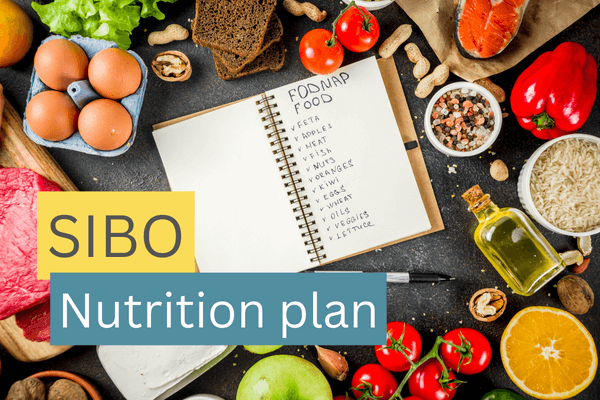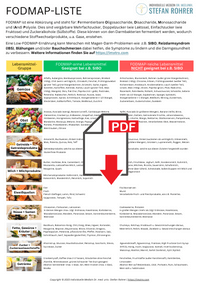
A SIBO diet plan outlines which foods are better to avoid in SIBO, and which foods are more likely to be well tolerated. But first, briefly: What exactly is SIBO?
SIBO is short for Small Intestinal Bacterial Overgrowth. A number of symptoms are subsumed under the term. A collection of symptoms refers to a syndrome. A syndrome can have various causes. So much for the terminology.
The cause of SIBO is unusually high levels of bacteria in the small intestine, which normally contains a low density of bacteria. These bacteria produce gases through the fermentation of food and lead to a number of unpleasant symptoms such as flatulence, abdominal pain, diarrhea and bloating. A diet plan specifically designed for SIBO can help relieve symptoms and improve gut health.
Table of contents
SIBO diet plan: Foods to avoid when you have SIBO
With a SIBO diet plan, certain foods should be avoided as they can worsen symptoms. These include:
- Carbohydrates with high FODMAPs.: Carbohydrates, especially lactose, fructose, sorbitol, xylitol and raffinose can be fermented and this can lead to gas formation and discomfort. Foods such as dairy products, fruits such as apples and pears, legumes and onions should therefore be limited or avoided.
For your information: FODMAP is short for “Fermentable Oligo-, Di-, Monosaccharides and Polyols. Further down this page, feel free to download our free SIBO nutrition list / FODMAP list.(Wikipedia: FODMAP) - Cereals containing gluten: Gluten, especially for people with certain genetics (HLA types), can affect gut health and promote inflammation. Especially the nowadays ubiquitous cultivated wheat causes problems. But also other gluten-containing grains such as barley or rye, among others, should be avoided if necessary.
- Dairy products: Milk and dairy products contain lactose, a sugar that can be fermented by bacteria in the small intestine. This can lead to flatulence and diarrhea. It is advisable to avoid milk-based products or choose lactose-free alternatives.
- Sugar and sweeteners: Refined sugar, honey, syrups and artificial sweeteners can cause problems and promote dysbiosis. It is advisable to avoid these products.
Recommended foods for a SIBO diet plan
A SIBO diet plan should consist of foods that are well tolerated and promote healthy gut flora. Here are some recommendations:
- Low FODMAP cereals: Rice, quinoa, oats, buckwheat and millet are well tolerated and provide important nutrients.
- Low FODMAP vegetables.: Green leafy vegetables (such as spinach and kale), cucumbers, carrots, squash, celery, zucchini, and bell peppers are good options because they contain fewer fermentable carbohydrates.
- Low FODMAP fruits: Fruits such as bananas, berries (such as raspberries and blueberries), citrus fruits (such as oranges and grapefruits), and pineapples contain fewer FODMAPs and may therefore be better tolerated in a SIBO diet.
- Lean protein: Chicken, fish and eggs are good sources of protein and easily digestible. Red meat should be only enjoyed in moderation.
- Healthy fats: Avocado, olive oil and coconut oil are healthy sources of fat that have anti-inflammatory properties and can support gut health.
- Fermented foods: Yogurt (non-dairy based, if applicable), sauerkraut, kimchi and kombucha contain probiotic bacteria that can promote the growth of good bacteria in the gut.
SIBO food list for download
You are also welcome to use our free SIBO food list – this will help you create a SIBO nutrition plan. To download, simply click on the image and the list will open in a new window. You can then either print and/or download the SIBO food list.
More tips for a healthy SIBO diet plan

In addition to choosing the right foods, there are a few other tips that can help in designing a healthy SIBO eating plan:
- Eat meals regularly and in appropriate portions: Regular meals in appropriate portions help to avoid overloading the intestines and promote healthy digestion. It is advisable to avoid large meals and instead eat smaller, more frequent meals.
- Thorough chewing: Thoroughly chewing food aids digestion, the release of digestive juices and facilitates the body’s absorption of nutrients. Chew the food pulp in your mouth for at least 10-20 times. Take your time when eating and focus on chewing each bite well.
- Drink enough water: Adequate fluid intake is important to maintain healthy digestion. Drink enough non-carbonated water throughout the day and avoid excessive consumption of caffeinated beverages or alcohol. The water consumed should be of high quality, your body consists mostly of water.
- Stress reduction: Stress can negatively impact gut health and exacerbate SIBO symptoms. Likewise, in phases of stress, the digestive juices are insufficiently released and the blood flow in the gastrointestinal area is shut down, so that this has a negative effect on the digestion and might promote a faulty digestion. Undigested food residues are then fermented in the small intestine and lead to gas formation and the SIBO symptoms. Find ways to reduce stress, such as regular exercise, relaxation techniques like meditation or yoga, music (e.g., binaural beats), and getting enough sleep.
- Support from a professional: The creation of an individual SIBO nutrition plan can be complex. It may be helpful to see a nutrition expert or a doctor who has experience with SIBO. They can help you identify trigger foods and create a customized nutrition plan. A low FODMAP diet should be practiced for a maximum of 6-8 weeks or, if longer, the advice of an expert should be sought.
SIBO Nutrition Plan – Conclusion
A well-designed and customized SIBO diet plan can help alleviate the symptoms of small intestinal bacterial overgrowth and improve gut health. A diet low in FODMAP can also positively influence the symptoms of irritable bowel syndrome. By avoiding certain foods that promote the growth of undesirable bacteria and making specific choices about foods that are well tolerated, sufferers can reduce their symptoms and make their daily lives easier. However, it is important to be aware that a SIBO diet plan should be customized and it is advisable to seek assistance from a professional to achieve optimal results. With proper nutrition and a healthy lifestyle, SIBO can be better controlled and quality of life improved.
Dr. univ. med. Stefan Rohrer is not only a general internist and gastroenterologist, but over the years he has worked extremely intensively with chronic complaints and diseases of the digestive tract, treating numerous patients and also significantly improving their condition. SIBO is one of his specialties and he has broad expertise in this area. A change in diet alone does not always help, but it is an important component of therapy. Based on a thorough medical history, review of any previous findings and individually tailored diagnostics, Dr. Stefan Rohrer gets to the bottom of the causes of your complaints. Please feel free to make an appointment if you would like further clarification and therapy of your symptoms.
Read also:
- Further Information about SIBO
- Further information about SIBO symptoms


 PDF format (5,4 MB)
PDF format (5,4 MB)